The Great Depression: What You May Not Know
The Great Depression had a huge and lasting impact on every American in how they lived and went about everyday life. Never had this country faced such uncertainty with such a long period of despair that citizens lived through and could be looked back on.
There were so many challenges these individuals had to overcome that the people of today could learn from. I’m excited to share this resource called The Great Depression: what you may not know.
Related: How to Survive in a Homeless Shelter
The Great Depression: What You May Not Know
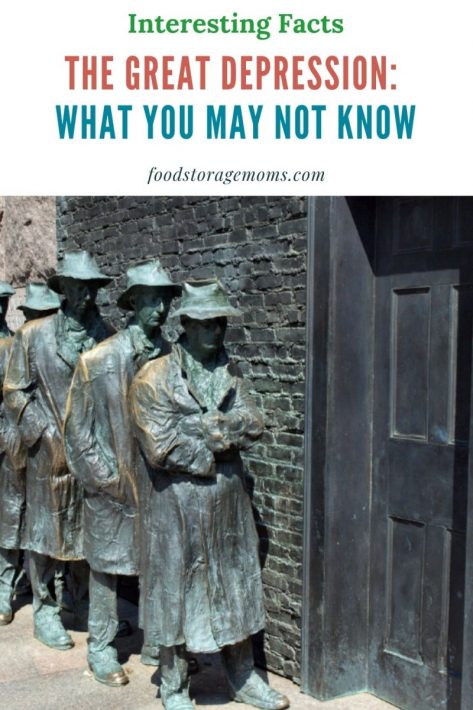
It wasn’t just the United States that suffered during this period of time. Due to these dark days, certain world leaders began to rise up to meet the many challenges. Hitler and Mussolini were two ruthless dictators who proposed plans for improving their country’s economy, but their strategies and misguided tactics also brought about the second World War.
Here’s more about the Great Depression, as well as other related events that made life extremely hard not only for the American people but for the rest of the world.
Crime Increased
There was a definite crime boom that took place during this time while people were unable to find work. With unemployment rising and without an effective welfare system to rely on, crime became a way of living for many. People resorted to stealing, smuggling, and other illegal activities.
Makeshift Towns were Created
Homelessness was another huge issue during the Great Depression, with over 2 million people left on the streets. Some of them resorted to building temporary “homes” on private property.
Not surprisingly, as similar to today, many people blamed the president for the crisis that was crippling the nation.
Herbert Clark Hoover was the president during this time and was heavily criticized. To direct blame for where they felt it was due, the slums that were created became known as “Hoovervilles.”
These shacks were small shanties that were mostly built out of cardboard, lumber, glass, and tar paper to house the homeless population. At the start of the depression, there were an estimated 500 of these Hooverville towns.
But as the 1930s approached, there were nearly 6,000 of them. It wasn’t until 1941 that they were all removed, and other programs were put in place.
The Great Depression: what you may not know is a great resource for understanding HOW things worked.
Political Unrest and Social Upheaval
About this time, many protesters and WWI veterans began hunger marches on Washington. Many unemployed workers, particularly those tied in with Unemployed Councils made up the bulk of those involved in the marches.
By the name, you would think they were organized by the hungry. Indirectly they were since the marchers were fearful that without work they couldn’t properly feed their families.
The theme for the hunger marches was “Work for Wages,” with a push for Congress to address the need for special relief, particularly unemployment insurance.
The most famous hunger march was called the Ford Hunger March since it took place at Ford Motor Company’s plant on March 7, 1932, in Dearborn, MI. It became a bloody confrontation with five marchers killed by local police.
There was also another march called the “Bonus Army” march of 1932. It didn’t end well since the protestors were violently removed by the army, led by General Douglas MacArthur, where their tents and belongings were burned to the ground.
New Trade Policies Prolonged the Crisis
It has been concluded by economists and experts that it was the stock market crash that brought about the Great Depression, but it was the trade protectionist policies that only worsened its pro-longevity of it.
These new laws were put in place in order to help improve the current situation, but they completely backfired and with devastating results.
One of these laws, the Smoot-Hawley Tariff, sought to raise U.S tariffs on imported goods to their highest levels in U.S history.
In response to this, several European countries refused to buy U.S goods during that time, which certainly didn’t help matters since US workers lost their jobs.
The Gold Standard
It was during the 1920s that the gold standard was introduced, right around the time WWI ended. This is when the U.S dollar became equivalent and backed by a certain quantity of gold.
Many economists put the blame on the gold standard for also contributing to stretching out the Great Depression because the federal reserve was unable to expand the money supply in order to help banks and get the economy rolling again.
The Dust Bowl
If things weren’t already bad enough, the Dust Bowl only made life that much harder, especially for farmers living in the Great Plains.
Over 100,000,000 acres of farmland became wastelands and ruins because of the severe drought and dust storms in the region. Even people living on the east coast were affected by it.
Farming became virtually impossible because of the eroded soil and living conditions became very poor. As many as 7,000 men, women, and children lost their lives from pneumonia caused by the dust and debris.
The Dust Bowl would go on to last for 6 years, causing further turmoil, in addition to the crisis already gripping the nation.
One of the worst of these storms took place on Black Sunday, April 14th, 1935. A massive 1,000 miles long blackened cloud turned the day into night, with dusty-gusty winds that reached up to 100 miles an hour.
The storm took multiple lives, forcing thousands of people to find other places to live.
It Had a Global Impact
The Great Depression may have struck the heart of the United States, but it had a huge impact on several other countries around the globe.
Countries including Canada, the United Kingdom, Australia, Chile, South Africa, Greece, Brazil, Poland, New Zealand, and Italy faced an unprecedented economic decline.
Out of all of the countries and nations that were affected, Germany was especially hit very hard. Not only was the country dealing with their own economic woes, but the social and political chaos caused instability and unrest among its leaders.
It was during this time that Hitler’s Nazi Socialist Party came to power as a political move stating they could solve the country’s challenging issues.
WWII Brought an End to the Great Depression
Roosevelt’s “New Deal” may have had a positive impact during the crisis, but it did not bring an end to the depression. You may not be aware, but it was WWII that helped America get out of the hole she was in.
Because of the mobilization of men and women and the need for a workforce to support the war effort, the unemployment rate fell dramatically, to as little as 10%. In our more recent economy that would seem high, but it was down significantly from the height of the depression.
To put that into perspective, while the Great Depression was at its worst, 1 in 4 families were found without work. This was a huge improvement compared to the prior decade.
Why Am I Discussing The Great Depression Today?
Those of you who consistently follow my blog posts and visit my website are familiar with a common theme: we never know when events and circumstances around us will change and challenge our way of life.
It could be a sudden illness, a loss of job and livelihood, another 9/11 or Katrina storm. We could be caught in a 100-year flood, a firestorm, an earthquake, or as we are experiencing now a global pandemic.
The key to feeling safe and confident as we face these unforeseen events is to personally prepare in advance for what may be needed to protect ourselves and our families.
So many tend to think the local, state, or federal government will have the resources to jump in and solve our problems and make things good, or like they used to be.
As we’ve seen lately in the responses to the Covid-19 pandemic, there isn’t enough food, water, money, medical equipment / protective clothing, and other critical supplies to maintain support for all those who are affected.
Make A Plan
So what do we do? Today, if you haven’t already, start putting together a plan for the steps necessary to make you and your family more self-reliant.
As I’ve stated so many times before, start small, acquire things your family actually needs and will use, and be consistent as you work to achieve your goals.
That may include water, food, first aid supplies, blankets, medications, and so much more. You know your family better than any other one else, so put your knowledge to work. I’m hoping my blog posts will help guide you on things to consider.
Part of being self-reliant is to have your finances in order. Please plan to set aside some money every month that can be used as a backup reserve for anything that may come your way. You’ll be glad you did.
Final Word
Learning about the history of the Great Depression is very important for several reasons. You’ve probably heard the phrase, history has a way of repeating itself?
Not only can we learn from the mistakes that our country and certain individuals made, but we also can learn how they could be avoided. What are some other Great Depression information and history that you know about?
Even at this very moment, we are facing uncertain times in the world we live in. Are there history lessons that we could look to, to keep us from making repeated mistakes? May God bless this world.
Other Posts to Check Out
To learn more about being prepared during or before a depression, check out some of my other posts:
Copyright Images: Bread Line Deposit photos_89644266_s-2019, The Great Depression Deposit photos_2267141_s-2019

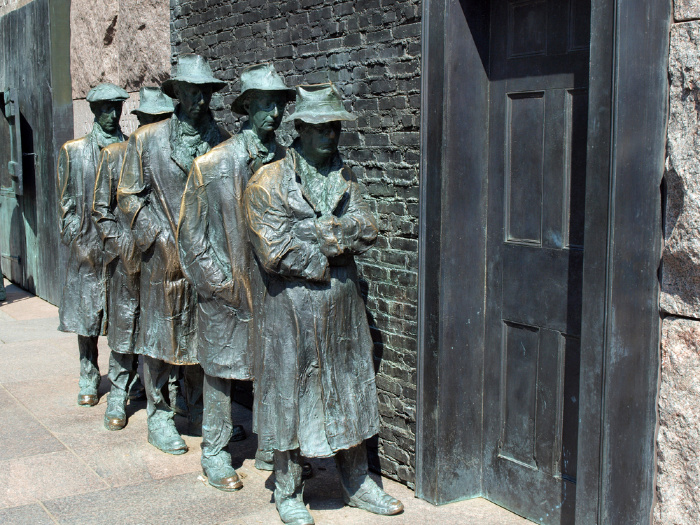



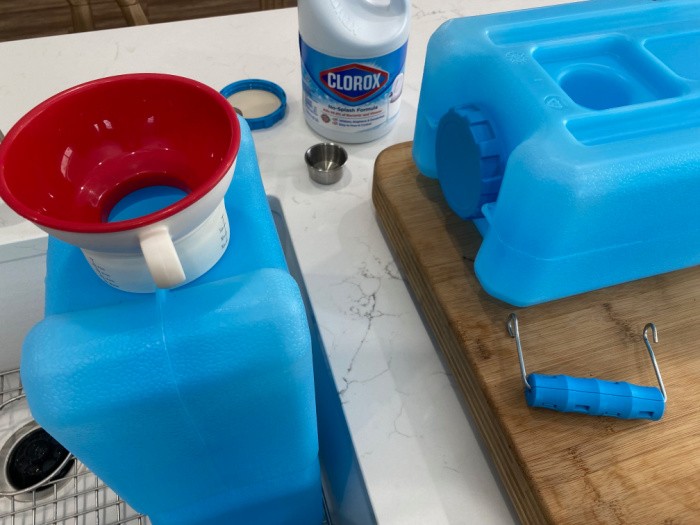
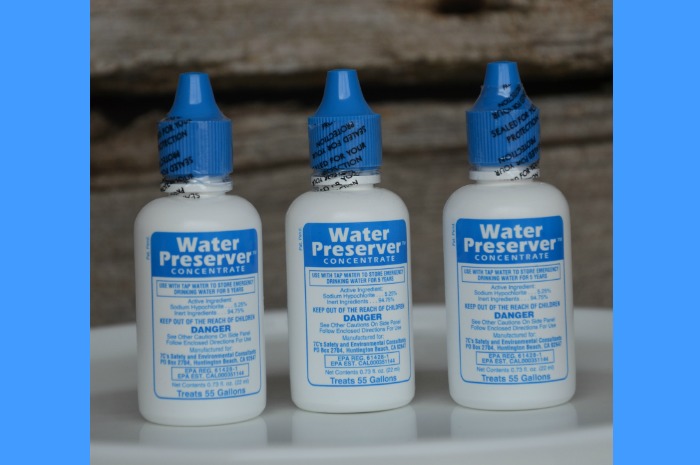
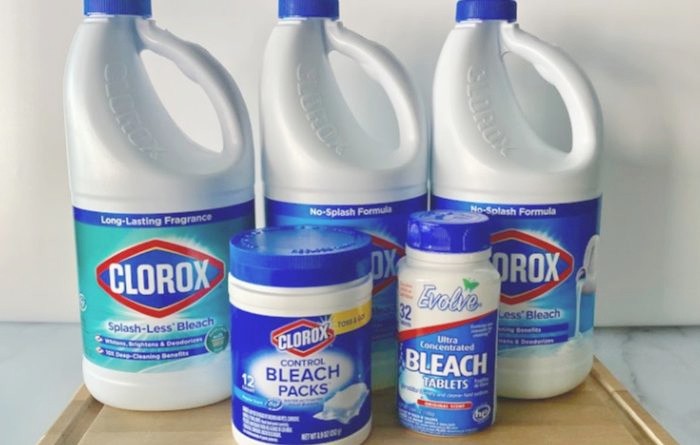


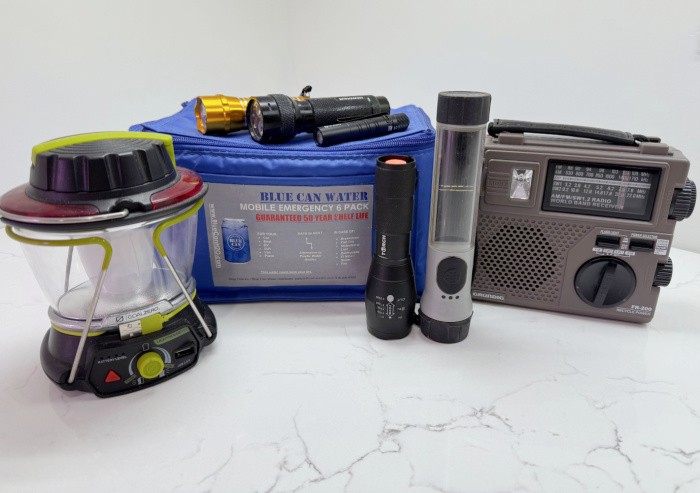
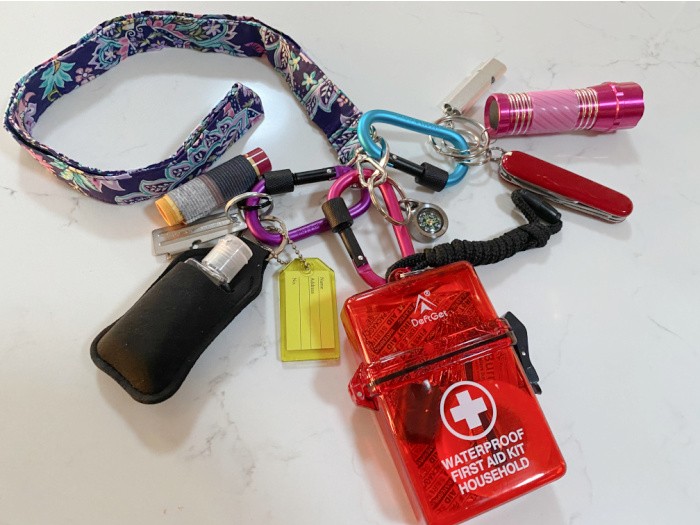










I remember my paternal grandma saying they were so poor they didn’t know there was a depression. They were farmers and that’s how they got by. I’m not a farmer, but if I can get some staples like rice & beans, I believe I can grow enough veggies to keep my family healthy and well fed. Because I have never been hungry, and neither have my children or grandchildren. we have been spoiled and wasteful. Oh, how I wish I could still ask my dear grandma for advice!
Hi Roxanne, that’s so true about the beans and rice. I wish I could talk to my great grandmother today. I have great memories with her but we always had food. But I do remember we ate a lot of lefse (like a tortilla). And lots of cheese. We are Norweigan and those were staples in our family. If we can get people to grow a garden we can survive. I’m hoping this is a wakeup call for a lot of families. What would they do if they couldn’t get takeout from the curbside? THEN, just maybe they would have to learn to cook from scratch. Just my two cents. Stay safe and well, Linda
Thank you so much for your article, I’ve learned a lot that I didn’t know about.
My parents were very young during the depression, but they could remember many things about it.
I understand a lot more now that I’ve read this. Once again, thank you very much!
Hi Cathy, thank you for your kind words. I think some of us myself included have been a bit spoiled with being able to walk in and buy food or stuff by laying down the cash. Now, that is not so easy anymore. Items are missing and people are out of work. I pray everyday families including my own without jobs right now can weather through this mess. I try to stay positive but I personally do not think this mess is going to turn around anytime soon. I hope I wrong. Stay safe and well, Linda
Great article! Right now here in the UK, I have been laid off work for a month up to now. No wages. However, we have an emergency stash and we can survive for 5 months without worry. Hopefully my old job will fire back up, but if not, I will get another.
The article above contains sound advice, pay heed.
Hi Paul, thank you for your kind words. I’m so sorry to hear you have been laid off. BUT I love hearing you have a 5-month stash to keep you going. I pray your previous job does indeed fire back up. I love your positive attitude. Stay well, and stay safe. Linda
Great article, my grandmother will be 107 this June. She has lived through it all
The stories I have heard have inspired me so much. She is a very strong woman. We Americas are so wasteful. As sad as it is what we are going through now as a nation, truly puts things in perspective
I am blessed have been canning in the last several years and have alot put.back to eat. My pantry is full. I may eatl lot of the same things but I won’t go hungry. I may be old and on social security but I’m fine
We need to learn to hope for the best prepare for the worst. Learn from history, many thing we can’t control, many we can
. Be smart, be thankful for have, plan ahead and always realize things could be worse
HI Laura, great comment. I love hearing you have been canning and your pantry is full. We will indeed survive because we have the tools. I live on Social Security as well. I turned 70 this year. I’m so grateful I have my blog to write and interact with people just like you. It keeps me busy and I know God has a hand in all I write and show my readers. Stay well, stay safe, Linda
Hi I just saw your reply to food storagemoms. I am also 70 and love living simply so have a lot of newsletters I read about living as we did in the past 50 years. We decided to not be hooked to electricity or water and heated with a woodstove so we could also cook on it. We had another one outside to use in summertime. We raised our family of ten children and homeschooled as well as having a garden and chickens, and goats and a cow and ducks and turkeys and pigs. We were small scale and only produced enough to keep our family going. I noticed you have a blog and I would be interested in joining to hear what you have to share. My name is Linda Smith could you share an address for you blog? Thank you. PS. I have received this newsletter newsletter for many years and always appreciate reading the comments also. This was an interesting informative one on The Depression. It is sad to see how much our younger generation has lost out on. Our children are all grown and have their own grown families and often thank us for all they learned about survival and what most people call roughing it as they shake their heads and ask how we could live like we did. I looked at it as a blessing and now our family also understands the peacefulness and freedom of a simple lifestyle as they attempt to keep up to society and all that comes with that. I am not sure if we can share information but will include my email address in case we can. lindasmith876@yahoo.ca
Hi Linda, I’m Linda Loosli and I am Food Storage Moms. This is my blog and I am 70 as well. If you have Facebook I also have a private (public I guess) group we talk and share ideas on food storage and preparedness. I admire how you raised your ten children!!!! Isn’t it wonderful how your family thanks you for all they learned growing up as a family? I love it! Here is my link to my Facebook Group: https://www.facebook.com/groups/293154608161380/ I hope that link works, Linda
Often we read about being spoiled or dependent, but as part of a society or community we actually do come to depend on others for certain things and this allows us as individuals to concentrate our time and efforts on the things we wish to pursue.
The problem is when the processes fail then we find ourselves wanting, desperate and suddenly unable to function and live as usual.
Every emergency or crisis re-enforces the practicality of being prepared and the advantage of being a little more self reliant than we need to be on a daily basis. The one effect of our modern technology is that it does tend to give us a false sense of security when things are disturbed and yet we live at a time when everything we need to be self sufficient (Long term food, generators, solar panels, water filters, advanced first aid and medical kits, etc.) and the knowledge to weather the storm is readily available. Preparedness is logical and not living in the past so much as learning from the past and adapting the old ways with new technology to survive our current world.
It’s a shame that those who don’t embrace preparedness don’t understand this and realize that those they call crazy are just people who love life and embrace the opportunity to protect and support themselves and their families. They are or we are people who take initiative and make preparations.
Hi Frank, I always love your wise comments! You and I have prepared for many years, it’s a way of life for us. I only hope and pray that a few families, okay a lot of families “get it” this time. Every few months or years we all have disasters in a few different ways, depending on where we live. Stay well and stay safe, my friend, Linda
Hello Linda! Interesting historical perspective on the Depression. My parents and the older relatives used to talk about that era, though most were pretty young. And my mom would have agreed with the comment that they were so poor they didn’t pay attention to it! It was pretty common for people in the Midwest to live in tiny houses that had tarpaper on the outside. It was also common for children to strike out on their own in their early teens. My grandfather had a huge ranch, was very prosperous, but my dad left home at age 13. That would have been in 1934, middle of the Depression. He stayed with his much older brother for a couple months while doing manual labor for a bit of cash, sometimes for food or building materials. Dad bought a small lot behind his brother’s house, built a one room tar paper shack, all before age 14! 6yrs later, this was where my folks started their married life. One thing my folks told me they’d observed over their lifetime is the sheer amount of Things we have now, versus how few they had then. Lol, my folks didn’t mind having a lot of clothes, a big variety of canned goods and fresh fruits/vegetables. Dad said progress in preserving food and transportation of goods was why life kept getting better, even for those at the lowest income level. Mom added that she thought thrift stores helped too!
Hi Wendy, great story/comment!! Can you imagine a kid 13 years old today doing that? Oh my gosh!! I remember when Mark and I were first married, we didn’t know we were poor. We both grew up poor although we didn’t know it at the time. We put him through college without grants (not sure they had them back then) or any student loans. I babysat kids, ironed clothes for people, and he worked three jobs all while going to school fulltime. Life is so different now. I remember we had a small triple dresser (six drawers total) for all four girls we raised. That changed once they got older, they had their own dresser. But now I see closets full of clothes for some of my granddaughters. They couldn’t possibly wear all those clothes in their lifetime. LOL!. Sorry, I’m rambling. But boy the times have changed. I had two pairs of shoes, one for play and Sunday. The Sunday ones would have been handed down of course. I love seeing my grandkids that are older buying clothes from thrift stores and altering them to fit. I think more and more people will be doing this with all the jobs that have been lost. May God bless all of us, Wendy, Linda
Linda, I too remember years when I was 6 or 7, and it was a great luxury when we’d go to the salvation army to get clothes or shoes. I don’t remember ever thinking we were desperately poor but now I realize we must have been. And my dad was a civil engineer! He was in and out of the va hospital with lime blood poisoning from concrete work for almost 3 yrs. This was in the early/mid 60’s. There was No foodstamps, energy assistance. I do remember one time my mom crying because she had to ask for a county ‘food basket’ as she knew it’d be published in the local newspaper. Oh, and much later yrs, my folks went to buy a house and the banker called, said we owed money to the county for this, plus interest, so this needed to be taken care of before home loan could go thru. The initial cost was $25, but with interest/fees was over $200. The banker even said this was nuts but he had no choice. So, my dad paid this (half his weekly pay) and my mom said: why don’t they publish when somebody pays them off?!? Different times for sure.
Hi Wendy, wow, a civil engineer, awesome! Can you imagine the courage it took for your mom to ask for that basket of food? And then to be asked to pay interest on it many years later. AND to have it published in the local newspaper?? Oh my goodness. It’s funny after writing that article I kept thinking about my childhood. I’m 70 so I didn’t live through it of course. My mom was born in 1929, so her parents did for sure. Looking back I kept thinking we rarely went to the doctor. We “fixed” ourselves for strep, measles, chickenpox, mumps, and influenza. There is no way they had health insurance. We had two couches that didn’t match with pillows in the broken frames, covered with quilts. I never thought I was poor. We were. But we learned to work hard and canned food baked bread, and sewed all of our clothes. Life was good, I learned a lot. And so did you! I’m so glad we have met through my blog, stay well! Linda
Linda, You mentioned people sitting in line for the Food Pantry. I heard a farmer talking the
other night on National News that Farmers are having to plow under their chops because they can’t
get them to where they need to go. This farmer said he has plowed under 4 MILLION pounds
of Green Beans and 5 MILLION pounds of Cabbage. A dairy farmer he knew had dumped 1/4 of
a Million pounds of MILK. How sad this that? Where is the government when it comes to helping him
and other farmers. Another thing if someone could tell me why is it so hard for our truckers don’t
have a place to use the bathroom or get a hot meal? I know the workers have to be safe but to
not go a little out of their way to walk out to a semi full of food or other things we need to live on
and take their order and bring it out to them. I mean really, why? If this all keep happening we will
be back to a depression. Can you think about all this food being plowed under?
Hi June, I saw something on TV showing all of this. The farmers were dumping the milk something about being past the 2-day period as I remember. Then a blueberry farmer who can’t get the immigrants to come over the border. He said he needs the immigrants because the Americans would not do the work they do. I understand the reason they are dumping milk is the schools being closed and the restaurants being closed and no one can buy it. I can only say what I have seen on TV, but my gosh, put it on the Facebook family would bring gallons to get that milk. But that would be against the law I guess. I’m too old to go pick fruit but when I was younger my kids and I did it all the time and we canned every fruit we could get our hands on to survive. I’m afraid the Coronavirus is bringing on a Deep Depression. If you think about it, the country is bailing out companies and families. Where is this money coming from….???? I know they can use the help. We all can. But then what? This mess will take years to clean up. May God bless us all June! Linda
In reply to June K, I’ve heard the news and read the reports about the farmers losing crops and pouring out milk. Problems they certainly don’t want. They however grow and sell to commercial markets. Since schools and restaurants are closed they have no viable customers It’s the same with the TP manufactures, Commercial customers are gone and residential TP is totally different.
Hi Beth, I saw this as well on TV. It’s so sad, Linda
On the evening news, I have watched the lines for food I have felt so sad for people. It all comes down to that we must prepare for the unexpected. Have supplies in storage and a prepared pantry. May we all learn from this as a nation.
Hi Gayle, It makes me so sad to see triple wide cars lined up to get a box of food. I really hope we all learn from this experience as well. Linda
Linda,
I hope you seen the news this morning!!!!! Farm Bureau and Feeding America has teamed
up to take these crops from the farmers to give to the people in need. SOMEONE is listening.
How great is that???????
I understand what you are saying about a Deep Depression. The ” budget” for America is
like 4 trillion dollars and growing. I can’t even think about that much money, I have a panic attack
when my Credit card bill is over a $5000. To me that is way to high but working on getting it down
but is anything being done to bring down the 4 trillion dollar debt?
Has anyone seen prices go up in their area? Our local store charges $6.15 for 18 count of eggs.
I had bought them a few weeks ago from the same store for $1.99. We called the BBB and they
said they couldn’t do anything on 1 person complaint.
Hi June, this is awesome news! But now I want to learn who is picking them. That was one of the issues. Thank goodness someone is listening! I better go check the egg prices. One day we had to pay over $5.00 for a gallon of milk which is usually $2.79. I better turn the news on, thank you! Linda
In Washington state, we have a place with the government where we can snap a picture of the price gouging and send it in – then the powers that be can investigate the gougin.
I was raised by parents who grew up during the Great Depression. Dad was raised on a farm in the country so while they did not have any money to speak of, they always had plenty of food and could hunt for meat and fish in the river. Mom, on the other hand, lost her father in 1929. Mom was not quite 10 years old. At that time, she had 3 younger siblings and 3 older siblings still at home and 7 siblings grown and either married with families of their own or at least out on their own. Grandma farmed the 3 older sibs who were at home to the older siblings. Mom and her 3 younger siblings stayed with Grandma. Grandma took in washing/ironing and went out to clean people’s homes to make enough to feed the 5 of them.
Mom and Dad were VERY frugal. They started purchasing land as soon as they had some money saved early in their marriage. In the first 2 years, they had 2 children and lived on Dad’s parents farm where he grew up. When they had enough money, they purchased a piece of property with a small house on it and moved out on their own. Grandpa gave them a milk cow and 4 laying hens! After that, they were on their own. I remember when I was growing up, Mom and Dad worked out as well as on the farm. Mom packed fruit in the fall and carried the mail year round; Dad worked at a sawmill as well as carried mail. It was quite a time. But, we grew a huge garden and canned the produce; we raised our own meat: beef, pork, chicken and rabbits. We put up fruit that we gleaned from the orchards around us: apples, peaches, pears and apricots. So we had plenty but not much money to say the least!
The thing that concerns me the most about all this money that the government is “making” available to us is that at some point, it must be paid back and who does the paying? tax payers! I am sure our taxes will go up and up. I also wonder if the banks will fail like they did during the Great Depression.
Well, I have a tent and all my camping gear so I won’t be homeless!!! I always told my Mom that!!
Hi Leanne, you have a great and wonderful life, I always love hearing your stories. I’m worried about the payback as well. Nothing is ever FREE. I love your statement I will never be homeless because I have a tent. You are awesome! Linda
A very good article. Thank you so much. I really understand that now is not the best time that it was, literally a couple of months ago, it happens that I really want to go out and see people there, you understand that one awkward movement into the unknown and everything can be lost. My father told me about this depression, naturally from the words of his grandfather. It was very bad, people were swollen from hunger, and some also from cold. So this was the last time and I would not want this to happen again. Everyone will be even angrier and fight harder for themselves.
I’m afraid of the same thing. I think people will be much angrier and fight harder. Linda
Linda, when my mother made gravy, she used half milk and half water. It was just as good as the all milk gravy. I love this article and the ones that are in it as well. I haven’t read them all, yet. But plan on doing it. Thank you for all the information you share. You are one awesome lady, and I do love you. You are so caring and loving.
Hi Deborah, oh you made my day, I love how I have made friends through my blog. Life is good when kind words are exchanged. If we can cook from scratch we can survive, and 1/2 milk and 1/2 water is a perfect example when making gravy! Love you girl, Linda
My emoji didn’t show up. :^( :^)
@->— Rose
Hi Deborah, I love it! <3 Linda